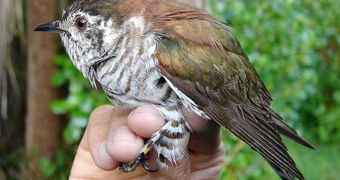Researchers have recently determined that an ability the nest-poaching New Zealand shining cuckoo possesses does not easily fit within the evolutionary model. They say that the trait the bird has, which is to mimic its host, the grey warbler, has never before been encountered in nature, a fact that makes it stand out form all other species. The new investigation was conducted by experts at the Massey University, who were led by doctoral student in biology Michael Anderson. He is based at the MU Institute of Natural Sciences, PhysOrg reports.
Generally, any similarities that are discovered between the ways the two species of birds call on each other can be explained through a process called co-evolution. According to a study published in 2008 in the journal Bioinformatics, this event can best be described as “the change of a biological object triggered by the change of a related object.” This means that similar species, living in close proximity to each other, will change together to a certain extent. What the MU team discovered is basically an exception to this rule, which is precisely what make the finding so bizarre.
This particular species of cuckoo usually deposits its eggs in the nests of grey warblers. Once the new generation hatches, the chicks begin to throw out of the nest all unhatched eggs or all chicks belonging to the warbler. Then, they proceed to mimicking the call the warbler chicks would have made, in order for their “surrogate” mother to feed them. In other words, they are the perfect hijackers, but researchers have always wondered how is it that they manage to do these things just as they hatch, when they are still very young. What is even weirder is that the cuckoo chicks emit the same “begging” sounds after killing all the warbler chicks, though they have no “model” around to emulate.
This trait is lost as the birds mature, when cuckoos and warblers produce entirely different calls. “While approaching the nest, parents tell their chicks that it is safe to beg for food. Parents also use alarm calls to tell their chicks when to be quiet when potential predators are nearby, making it more difficult for them to find the nest,” says Anderson of the warblers. The expert also learned that the cuckoo chicks experienced a delay in their growth process, due to the enormous energy expenditures that they need to set forth in order to evict the rightful inhabitants from the nest very early on.

 14 DAY TRIAL //
14 DAY TRIAL //